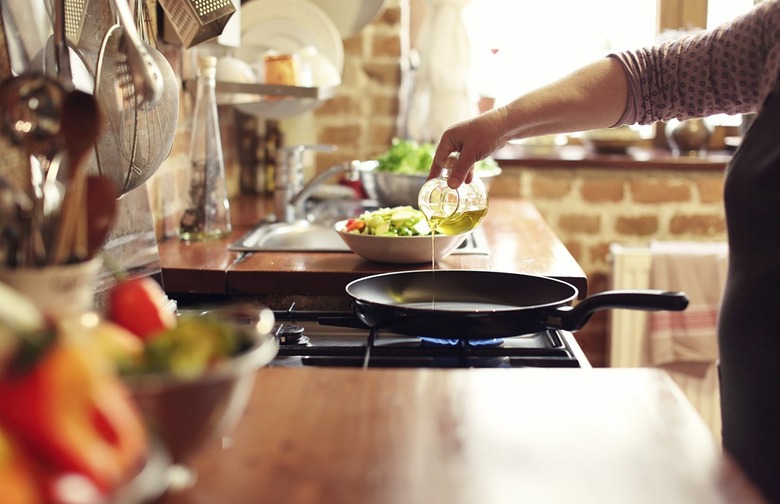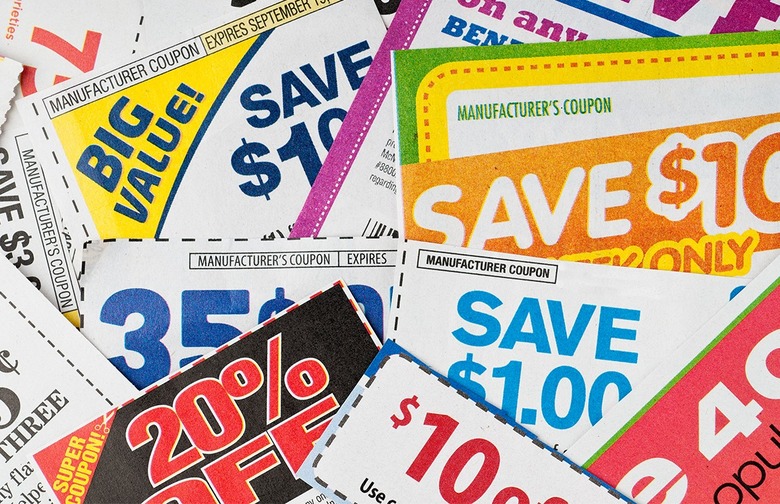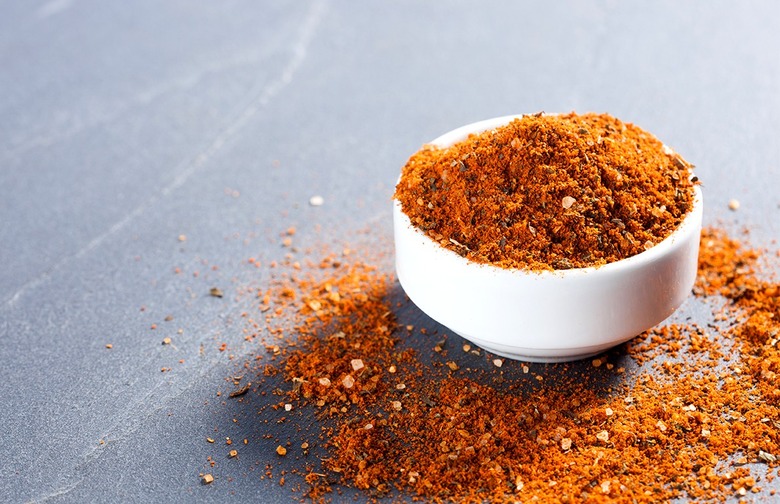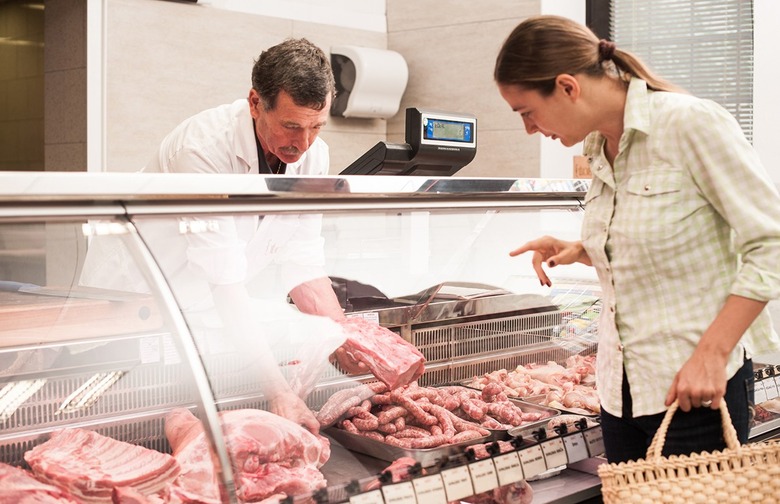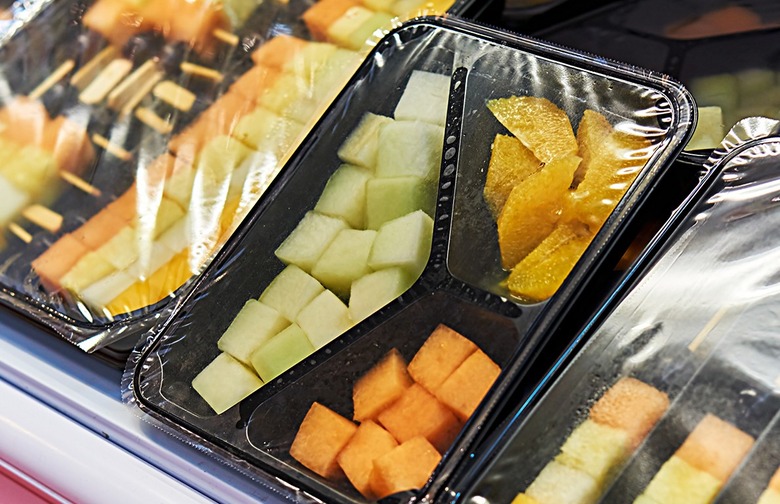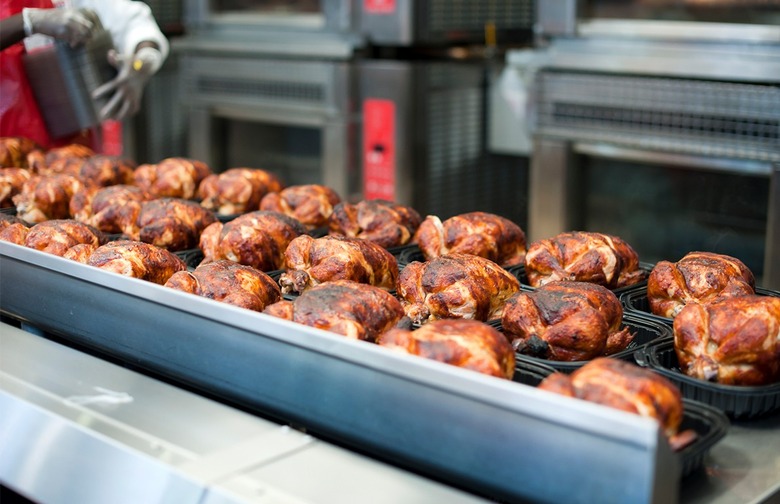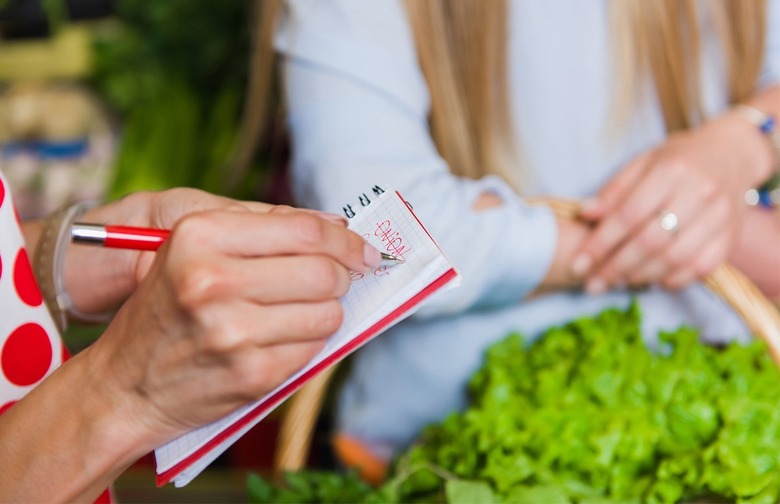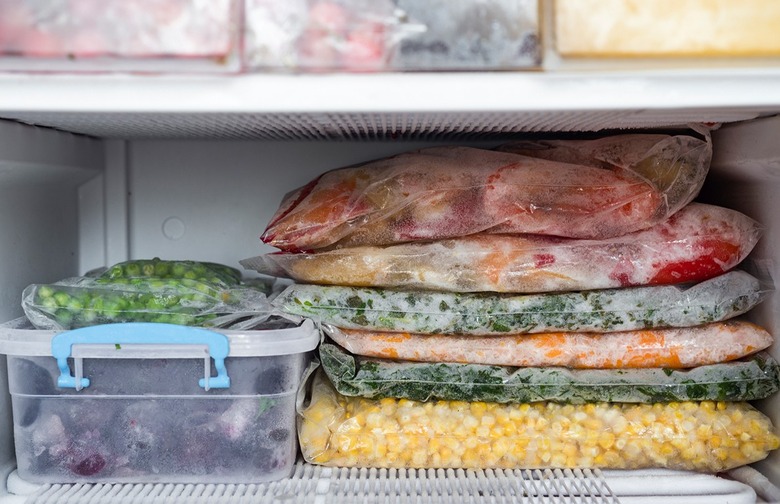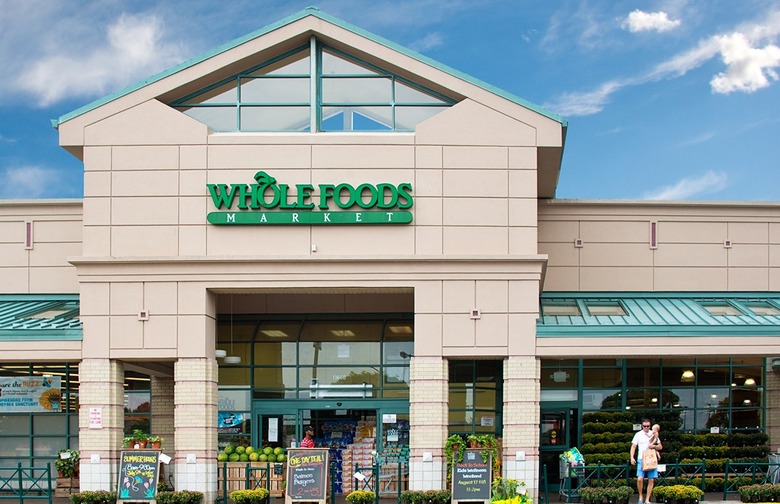Home Cooks Reveal Their Favorite Grocery Shopping Secrets
Most of the magic of home cooking happens in the kitchen. Once you learn some basic cooking skills and figure out your favorite ingredients and cooking methods, you're well on your way to becoming a successful home cook. Who needs takeout when you can whip up something delicious in less than a half hour?
But before you even start trying your luck at a new recipe or making a quick dinner dish, you have to do some shopping. Grocery shopping seems like it should be easy. You make a list, check it twice, and head to your local store to get all the ingredients you need. But once you actually do it, you probably find that there is a lot more to consider than just those basics. For instance: What brands do you buy? How do you prevent overspending? Are you putting too many unnecessary items on your list? Some items are better store-bought — but others you should quit buying altogether because they're worth making at home instead.
The only way to gain this valuable knowledge is through experience. And every home cook out there has a different experience to share. We asked some seasoned home cooks about their go-to grocery shopping tips. These are the tricks they revealed.
Always choose one splurge item
When she grocery shops, home cook and blogger Dina Deleasa-Gonsar likes to select one specialty item to splurge on in addition to her usual picks. "Things like fancy oil that is on sale or an ingredient you have never heard of are great ways to liven up your everyday cooking," Dina says. "It is a great way to encourage you to experiment!" With a fancy olive oil or a delectable spice blend, you can transform your more basic dinners into something that will have the whole family raving.
Check your fridge and pantry the night before you shop
It doesn't matter how seasoned of a chef you are; it's easy to forget which ingredients you already have on hand. "You don't know how many times I couldn't remember if I had something only to re-buy it," Dina says. "Check your fridge and pantry against your grocery list and make sure you are not overbuying."
Don’t just buy something because you have a coupon
Especially if you're someone who's an ace at couponing, you might have hoarded a bunch of deals on items you don't even really need. But, Dina says, make sure you leave some of them at home — only buy the items you actually intended to in the first place. "If you do not use it in your daily life do not be tricked into 'needing' it," Dina says.
Know when your grocery store stocks its shelves
There's nothing worse than finding out your grocery store is fresh out of one of the items you need. Grocery stores typically restock their supplies at least once a week; Dina says that simply by knowing which day that is for your store, you can save time you'd otherwise have to spend searching for items that may sell out. Make your trip to the store on the day of their restocking or the day after.
Separate your list into categories
Marissa, the blogger behind Eats and Beats, always divides her groceries into categories before she goes shopping. "I use the notes section in my phone to create three categories: 1) Weekly Meals 2) Lifestyle Staples and 3) Luxury Items," she says. "I shop for tier one ingredients first, which includes everything I need for the recipes I'll make for the week. Then, I move to tier two, which could be paper towels, bottled water, or healthy snacking foods." She tries not to overspend on tier two, only purchasing items that she really needs. After that category, Marissa evaluates her budget. "If I have some wiggle room, I'll move to tier three, which is luxury or self-care products," she says. These products include anything and everything extra, ranging from her favorite kombucha drink to a new shampoo she's been wanting to try. "These things should be purchased and prioritized last," Marissa says. "In my opinion, real self-care is being fiscally responsible and buying food that fuels your body and mind. It's not just bubble baths!"
Check the price per unit sticker
This money-saving hack can be done at any grocery store and can help you decide when it's really worth it to buy in bulk. "I always check the price per unit sticker when I'm out shopping to help budget," says The Daily Meal senior editor Carolyn Menyes. "That $7.50 bottle of olive oil may seem like it's a great deal, but that $10 bottle next to it has way more." Even though it's a more expensive bottle, you're saving money in the long run if the price per unit is lower!
Don’t buy spice mixes
"I almost never buy spice mixes," Carolyn says. "Chances are you already have all the spices in these mixes in your pantry." Instead of spending extra on a container of taco seasoning or an herb mix, you can easily blend a couple spices together on your own to make the exact same result. Here are a few recipes for the more popular spice mixes you might be tempted to buy.
Take advantage of seasonal sales
Holidays and seasons often come with opportunities to stock up on items that aren't normally bought in bulk. Donna Menyes, Carolyn's mother, recommends taking advantage of these seasonal sales. Even if you aren't throwing a Fourth of July party, you can take advantage of the sale on hot dogs and stock your freezer, for instance. Or you might buy lots of extra turkey around Thanksgiving. "These items can all be frozen and saved for later!" Donna says.
Get outside your comfort zone
If you're getting bored of cooking the same old foods you're used to, it's time to switch it up. "Take a gander at some foods you're less familiar with, whether that means just strolling down the 'international' aisle at the supermarket or making a special trip to a grocer that specializes in imported ingredients and spices," The Daily Meal copyeditor Jeremy says. "Bring your smartphone, and don't be ashamed to look up a food if you have no idea what it is or how to use it. The worst-case scenario is that you have to try something you don't like very much; in the best case, you might find a new standby or a fun curveball to shake up your drab dinner routine from time to time."
Buy local produce
"Try to buy produce from small neighborhood produce markets," The Daily Meal video editor Jacqui Wedewer says. "It's way cheaper there." You can find quality local produce at a farmers market — if you're lucky, you might live right by one of the best farmers markets in America!
Bring your own reusable bag
Not only is this tip good for the environment — it's also smart for your budget. "I used to do this to keep from buying too much," Jacqui says. "When it's full, that's all I'm buying. I knew if I had more food than what fit in that bag, food would just go to waste. I'd sometimes bike to the grocery store for the same reason." Her one exception is buying a 30-pack of beer. "That's just economical," she says, "and beer doesn't go to waste!"
Shop for deli and bakery items in the evening
The Daily Meal cook editor Daisy Nichols recommends timing your shopping ventures strategically. Certain foods, such as freshly baked goods and premade deli items, can be less expensive if you wait until the evening. "Things that are made freshly every day can often be bought at a reduced price towards the end of the day," she says.
Ask the butcher to grind specific cuts of meat for you
You could buy ground beef or ground chicken already packaged — but then you're risking the uncertainty of what cut of meat is inside. Daisy recommends asking the butcher to grind meat for you fresh, so that you have more control over the ratio of lean meat to fat and the part of the animal you're getting. "That way you don't have to buy any mystery blends of ground meat," she says.
Don’t buy precut produce
"Don't buy precut fruit and vegetables, which are priced to include cost of labor," Daisy says. "Instead buy whole fruits and vegetables and you'll save money." Take the extra couple of minutes to chop the vegetables yourself — uncut produce can last longer in your fridge, too!
Buy a rotisserie chicken
You'd be surprised how many different dinners you can make out of a cooked rotisserie chicken (and at Costco, they're less than $5 each). That's why Lucia Lee, the blogger behind the Instagram account @foodminimalist, recommends buying one to simplify weeknight meals. "The white meat can be used for salads and stir fries; the dark meat for hearty soups with vegetables; and the carcass can be used for making stock," Lucia says. "Even the flabby skin can be fried up to a crisp as a snack. Practically zero-waste!"
Be flexible with your grocery list
Recipes aren't usually all that strict — if it saves you money, consider making a few changes to your list of ingredients. "For example, if a recipe called for kale, but another dark leafy green is cheaper or on sale, go with that instead!" says Lucia.
Buy frozen and canned goods
Don't be afraid of buying fruits and vegetables frozen — they're just as healthy as fresh. Plus, they don't go bad as quickly, making them a convenient option for keeping nutritious staples at home. "It is easy to whip up a quick balanced meal with any of those ingredients on hand if you can't make it to the grocery store that week," Lucia says. There are all kinds of interesting meals you can make with foods from your freezer — or from cans!
Know the perks of your favorite grocery store
Stores usually offer promotions and deals that aren't advertised — and sometimes offer the opportunity to try items before you purchase. Peter and Akiko, bloggers behind the Instagram account @plantbased_matters, discovered this while shopping at Whole Foods. "At Whole Foods, most people are unaware that if you spot an item under $9.99 that you've never tried before, they can let you try it out for free," Peter says. "Also, we found out that most things sold there can net you a 10 percent discount if you buy in bulk. For example, if you planned to purchase five of your favorite wines, you should get one more and buy six — you'll get 10 percent off the entire cost." Whole Foods has a number of these shopping secrets that are often overlooked. Of course, every grocery store has different deals and policies. Ask one of the employees at your favorite grocery store what kinds of things they offer for people looking to try a new product or looking to stock up on bulk purchases.
Take advantage of restaurant supply stores
The Daily Meal Editorial Coordinator Shannon Darnall revealed an insider tip she learned working in the restaurant business with her husband, John Higgins. They shop for ingredients they buy in bulk, as well as tools such as chef knives, cookware, and baking supplies, at a restaurant supply store. Restaurants acquire almost all of their tools and food items from these stores, often paying a smaller price than the average consumer would find elsewhere. Shannon says that not only do you save money, but you can also acquire all kinds of hard-to-find kitchen and baking supplies, including fondant, food thickeners, and flavorings. Guess you have to be in the restaurant industry to know that secret — one of many restaurant secrets every home cook should know.
More From The Daily Meal:
Things Your Grocery Store Doesn't Want You to Know
35 Grocery Store Items You Should Never Pay Full Price For
24 Tips and Tricks for Saving Money at the Supermarket

